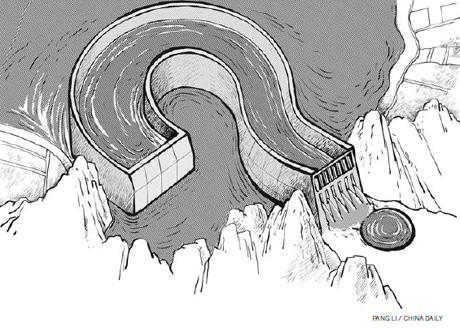View
Debate: Hydropower
Updated: 2011-06-07 08:00
(China Daily)

Should China go ahead with its plan to develop the hydropower sector? It definitely should, says an expert, while a professor of ecology and microbiology disagrees.
Zhang Boting
Hydroelectricity best for the environment
Hydroelectric power is the only renewable energy that can be used for large-scale economic development. The distinguishing feature of renewable energy is that it is inexhaustible and would be wasted if we do not exploit it.
|
||||
After the marketization reform of China's hydropower sector, its development has been under constant pressure from some extreme environmental protection forces. Some hydropower corporations lack experience in dealing with the media. Taking advantage of this, some media outlets have demonized China's hydropower sector. The result: the development of the original inexhaustible clean energy sector has been wrongly depicted as the prime reason for the destruction of the environment. But the higher the level of hydropower development, the better it is for the environment.
The large reservoirs, which prevent floods and supply water to dry areas throughout the year, have been maliciously blamed for cutting off rivers and aggravating the water crisis. Take the Three Gorges Dam as an example. It has drawn unjustified criticism because it is the largest hydropower project in the world. But it is the capacity of a hydropower project's reservoir rather than its power generating capacity that determines its impact on the adjoining environment.
The fact is that although the Three Gorges Dam is the largest hydropower project, it does not have the world's largest reservoir. More than 20 larger reservoirs have been built before the Three Gorges Dam, some of which are several times or even dozens of times larger and should have had a huge impact on the environment. This is to say that a large reservoir, not a project's power generating capacity, aggravates climate change to a large extent, and the Three Gorges Dam does not have a relatively large reservoir.
Media reports demonizing China's hydropower projects have misled the public and even influenced some decision-making departments of the government. As a result, some hydropower projects, including the one on the Nujiang River, have been delayed by years. For example, the hydropower project on the Jinsha River was halted during the 11th Five-Year Plan (2006-2010), but it turned out that rumors had hindered it. Because of the damaging reports many major large-scale hydropower projects have faced problems over the past few years, which curbed the government's capacity to manage water resources.
It is the shortage of important reservoirs to manage rivers' flow that has made China vulnerable to natural disasters like frequent floods and serious droughts along with water shortage and pollution.
The severe drought in South China, caused by insufficient reservoirs, has created a series of problems. And although the Three Gorges Dam will release 5 billion cubic meters of water downstream, we need to realize that its capacity is limited. Torrential rain has greatly eased the severe drought in central China, but it has also caused flooding in some regions. Some critics say big dams are useless, because they cannot combat droughts or floods. However, climate change has had a huge impact on the world, and China is no exception. It is the delay in building hydropower projects that has hindered China's capacity to deal with floods and droughts.
The Hutiaoxia or the Tiger Leaping Gorge project, planned as a key reservoir to manage the water resources of the Yangtze River, has been delayed by many years because it was very difficult to relocate the huge local population. But if the Hutiaoxia project is built on schedule and operates along with the Three Gorges Dam and other middle- and small-sized water conservancy projects, droughts in many areas can be combatted.
Since the hydropower sector was severely hampered during the critical period of China's fast economic development, it has lagged far behind the pace of the country's economic growth and its energy supply couldn't meet the existing demand.
Many countries have been calling for reduction in carbon emissions but China has to continue extracting more coal - up to 3 billion tons a year - damaging the environment further. The strong reliance on coal also leads to frequent social, economic and environmental problems such as lower coal output, transportation hindrances, frequent mine accidents and environmental damage.
The reliance on traditional energy such as coal put China under pressure at the Copenhagen Climate Change Conference and made the international community criticize the country's economic growth level.
The Chinese government has made a promise to the international community that it would raise the proportion of non-fossil fuel use to 15 percent and cut carbon intensity per GDP by 40 to 45 percent by 2020 from the 2005 level. Given China's real conditions and resources, whether or not it can fulfill its commitment largely depends on the progress of hydropower development.
It cannot be ignored that China's underdeveloped hydropower sector not only seriously tarnishes its image, but also thwarts its capability to combat floods and droughts - and thus hinders its economic growth. Given the country's real conditions, only optimum exploitation of water resources can help it achieve comprehensive, harmonious and sustainable development.
The author is deputy secretary general of China Society for Hydropower Engineering.
Specials

Birthday a new 'starting point'
China's national English language newspaper aims for a top-notch international all-media group.

Room at the inn
The Chinese hotel industry experiences a building boom, prompting fears of oversupply.

Pearls of wisdom
Chinese pearl farmers dominate the world market but now want to work smarter, not harder



